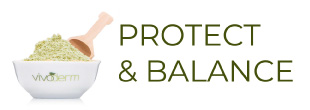Natural Facial Care for Sensitive Skin
Many people say they have sensitive skin because:
- Certain skin care products, or household products that contact their skin, cause stinging, burning, redness, and/or tightness.
- Although they have no visible effects after contact with a product, it always makes their skin feel uncomfortable.

- Beautiful Skin
Dermatologists, doctors specializing in skin, consider the diagnosis of sensitive skin when they:
- See skin reactions such as pustules, skin bumps, and/or skin erosion.
- Observe excessively dry skin, which doesn’t adequately protect nerve endings on the skin and may lead to skin reactions from cosmetics or skin care products.
- Notice a tendency to blushing and skin flushing, which may also be signs of sensitive skin.
If you have purchased manufactured skin care products or facial masques (masks), then you have probably used chemical products designed to mimic natural ingredients. These chemical products are sometimes harsh and can do as much harm to delicate skin as they do good. Sometimes it is more beneficial for your complexion to use a facial product using fresh, natural ingredients whenever possible.
All skin types benefit from exfoliation (removal of dead skin cells), and moisturizing ingredients. Some skin care products are designed to specifically exfoliate and moisturize and can be used by all skin types. others are best for those with sensitive skin.

- Healthy Diet for Skin
Herbs, fruits, dry fruits and some vegetables are generally used to make natural facial products. At times, certain cereals might also be used to prepare them. Since natural products are free of chemicals, you don’t have to worry about the side effects as well. Moreover, on using them, your face will radiate a natural glow that can, perhaps, not be seen when you use the shop-bought beauty products.
Specific guidelines are lacking, but most “skin-friendly” products contain:
- Only a few ingredients
- Little or no fragrance
- Methyl paraben or butyl paraben preservatives
If you have sensitive skin, avoid products containing:
- Antibacterial or botanical ingredient
- Skin-penetrating solvents such as ethanol and propylene glycol; opt for nonpenetrating ingredients such as polyethylene glycol
Sensitive skin tends to be thin and delicate with fine pores. It flushes easily, is prone to broken capillaries, is frequently allergic and can easily break out in a rash. There are many degrees of “sensitivity” in the skin, from very sensitive to slightly sensitive. Pay attention and identify and determine the resistance of your own skin.
Many people have sensitive skin today due to the overload of chemicals found in most store-bought products. Sensitive skin can be temperamental and does not take well to harsh treatments. It reacts to many environmental factors in an aggressive way, it gets red, swollen or itches because of exposure to the sun, wind, too cold or too warm water, alkaline water and many others. It may react easily to many ingredients in cosmetics, and in extreme cases, to even substances around the house. Some of the reaction of sensitive skin can be confused with some skin conditions such as: rosacea, eczema or sun damage. So you should consult a skin professional if you think your skin is temperamental.
If you have sensitive skin, never fear, with proper care, you can help your skin to find the right balance and look great for many years. First, your skin needs to be clean. Use a very gentle product twice a day, followed by a light toner. Your toner should be alcohol-free. You need to use a rich, but water-based
moisturizer. Avoid greasy products, lanoline, mineral oil, and other ingredients that may block your pores and cause black heads or pimples.
Although your sensitive skin is delicate, you may still use hydrating masks and a very gentle exfoliant once a week. Avoid steam during facials, and in general, avoid drastic temperature changes. Hot baths, saunas and steams may cause broken capillaries in your skin.
If you get professional facials, always tell your esthetician before starting that you have sensitive skin. She may not be able to extract as much as needed, but it is better than irritating your skin. Facial massages are good for you, because it stimulates circulation and relaxes the muscles. Be sure to have facials in a reputable day spa or medical spa where hygiene is paramount. If you have extremely sensitive skin, you should visit a dermatologist.

- Natural Skin Care
It is important to drink water to keep your system clean and hydrated. You need to pay attention to your diet to help your skin find the right balance. Try to eat fresh foods rich in nutrients. Some supplement of Omega-3 may benefit your skin. You can also consume this oil in flax seeds or salmon; among others. Choose butter over margarine and a little of butter or olive oil is good for your skin.
The objective of using a mask is to protect, soothe and combat inflammation and irritation on the skin. Sensitive skin needs very refreshing and calming ingredients that will not shock or irritate it. At home you may use Aloe Vera with a couple of drops of blue chamomile essential oil. To calm your skin, use natural products that contain calming ingredients like chamomile, oatmeal, cornflower, milk and licorice.
Tags: best natural skin care, best organic skin care, natural moisturizers, natural products, natural skin care, organic face masks, organic skin care, sensitive skin, skin treatments




